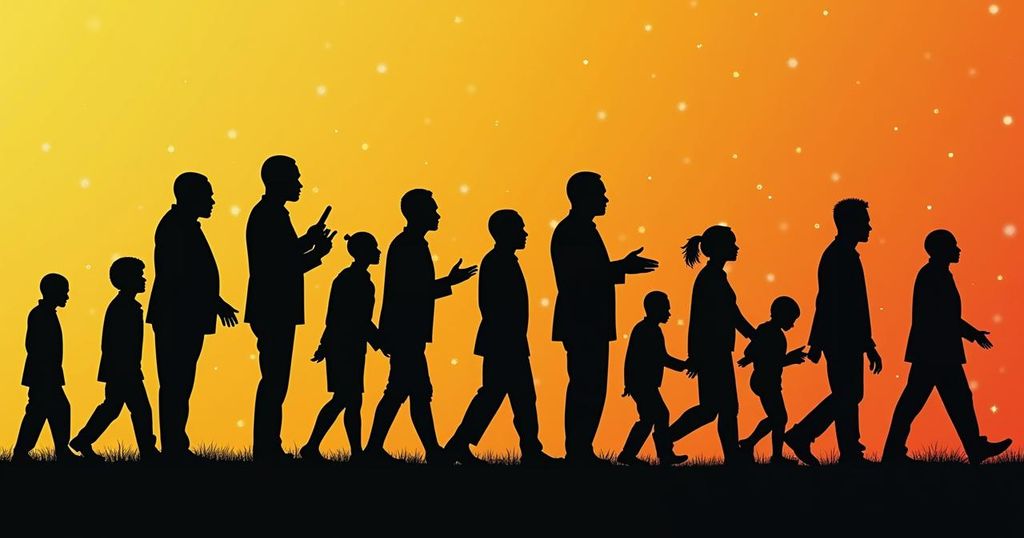Mozambique: Ruling Party Poised for Victory in Upcoming Elections
Mozambique’s ruling party, Frelimo, dominated by its candidate Daniel Chapo, is poised to maintain its power in the upcoming elections, with a largely fragmented opposition failing to present a concerted challenge. The National Election Commission is preparing for a seamless electoral process, while internal dissatisfaction within opposition parties raises questions about their viability.
In Mozambique, the ruling party, Frelimo, appears to be the leading contender in the upcoming elections scheduled for October 9, as evidenced by the pervasive display of vibrant red banners across the nation, symbolizing the party. The current President, Filipe Nyusi, who has served for a decade, is constitutionally barred from seeking a third term, compelling Frelimo to nominate Daniel Chapo, a 47-year-old provincial governor, as its new presidential candidate. Chapo’s image dominates campaign posters nationwide, overshadowing the largely inconspicuous campaigns of his opponents. Despite 36 political parties being permitted to contest for 250 parliamentary seats, it is evident that the opposition struggles to make a significant impact. The major opposition figures—Ossufo Momade from Renamo, Lutero Simango from MDM, and Venancio Mondlane—face significant challenges, including a fragmented support base and internal party dissatisfaction that undermines their campaigns. Chapo’s public declarations exude confidence in the supremacy of Frelimo’s contributions to the nation, leading some to label him as arrogant. In contrast, Momade’s campaign is criticized for a lack of vigor, and he appears to lack the ambition to rally substantial support. Simango emphasizes the need for systemic reform, stressing that Mozambique remains under the dominant influence of Frelimo, while Mondlane, an enigmatic figure who recently defected from Renamo, presents a controversial yet optimistic persona for younger voters. The electoral landscape is further complicated by procedural hurdles faced by smaller parties, a situation highlighted by criticisms concerning the National Election Commission’s handling of campaign fund disbursements. Nevertheless, the Commission maintains its readiness to conduct the elections without significant logistical obstacles, projecting confidence in the organization of the electoral process. As millions of Mozambicans prepare to cast their votes, the prevailing sentiment suggests that Daniel Chapo is positioned to ascend as the next president, continuing the long-standing dominance of Frelimo in the political realm of Mozambique.
The political context in Mozambique indicates a strong historical grip of the Frelimo party, which has maintained power since the country gained independence nearly five decades ago. This stability has resulted in a lack of robust opposition, with the ruling party’s strategies predominantly overshadowing those of its competitors. The current elections present a critical point for opposition parties that are fragmented and struggling to present a united front against the seemingly invincible Frelimo party. Daniel Chapo emerges as the new face of Frelimo, succeeding Filipe Nyusi, and poses as a significant figure in ensuring the party’s continued hold on power. The challenges faced by opposition candidates highlight ongoing concerns regarding political inclusivity and representational fairness in Mozambique’s electoral process.
In conclusion, as Mozambique approaches its elections, Frelimo’s established presence, personified by Daniel Chapo, reiterates the challenges faced by the opposition in gaining traction among the electorate. The inherent weaknesses within the opposition parties, coupled with an electoral environment that favors the ruling party, may diminish the prospects for change. Furthermore, the electoral management body’s commitments to a smooth process will be pivotal in determining the integrity of the elections. With expectations tilted in favor of Chapo, the outcome of this electoral contest will be of significant interest to both national and international observers.
Original Source: www.dw.com




Post Comment